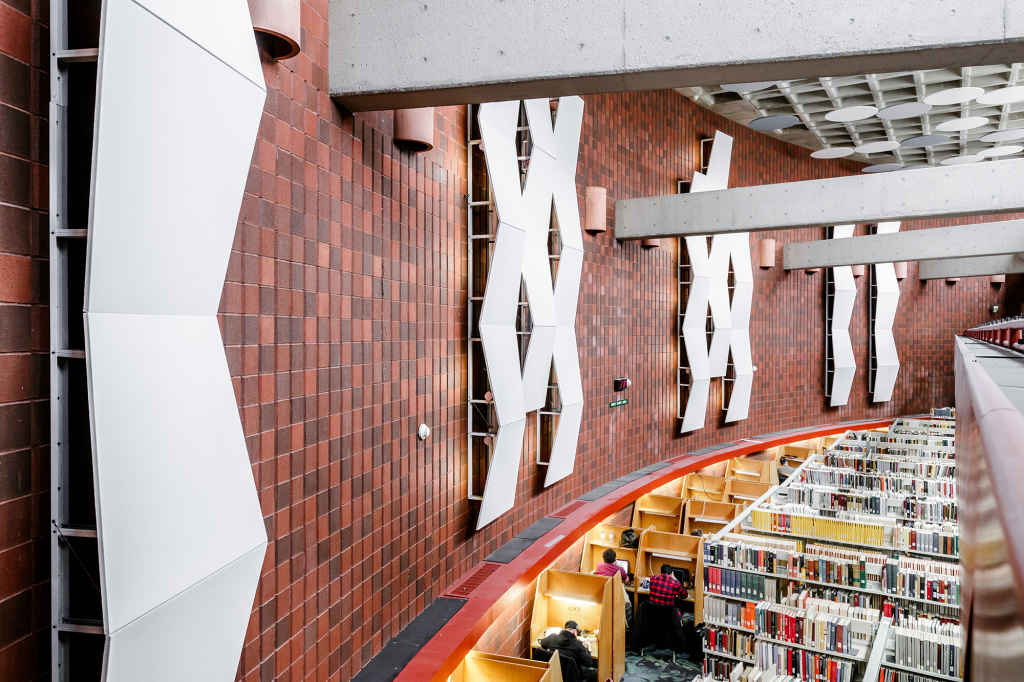McMaster University Library Impact Report 2021-2022
McMaster University Library
2021-2022 Impact Report
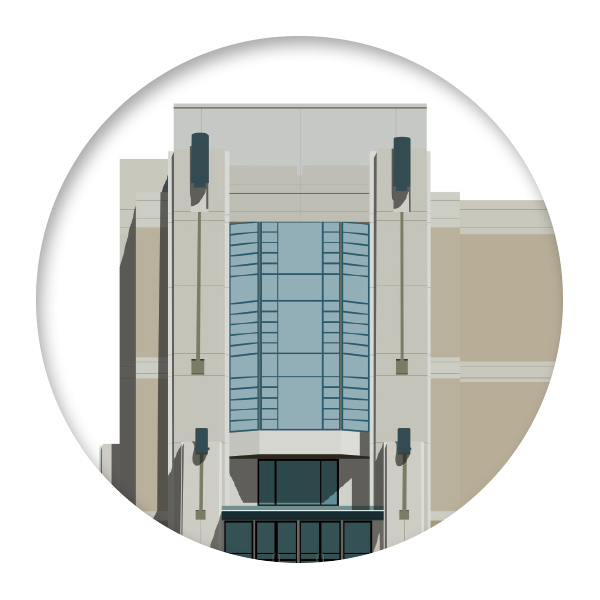

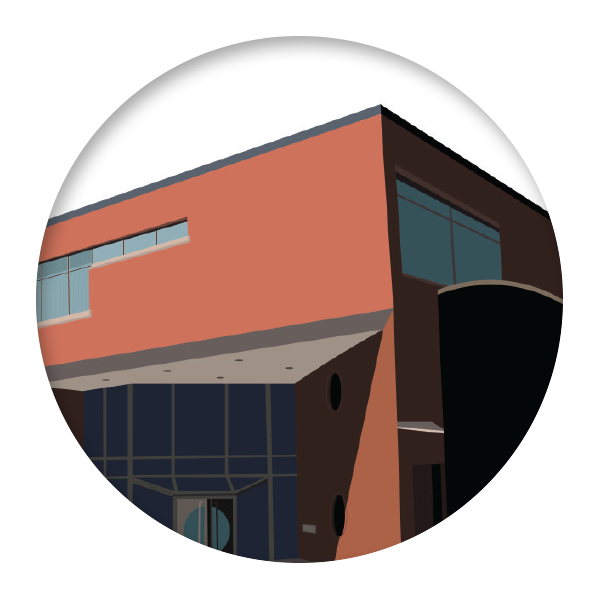
Message from the University Librarian
Most weekdays, I make the short walk from home to my office in Mills Memorial Library.
It’s a trek I have made for more years than I can easily count, but it’s one that took on new meaning in September 2021 when we marked the physical reopening of McMaster’s campus libraries after nearly a year and a half closure due to the pandemic.
Reopening our spaces this past academic year challenged our team beyond anything we had experienced before. Masking, physical distancing, evolving hours, and navigating hybrid and in-person work—it was not an easy time as we worked to meet the needs of our campus community.
Yet we also continued to take steps forward, albeit smaller but steady, on initiatives aligned with the key directions outlined in our current strategic plan. This impact report shares just some of the stories of our strategic work in 2021-22. The progress is a testament to everyone who works for our library, and the support of University leadership.

This past year, we expanded our research data management services to support McMaster’s research enterprise. Our campus classroom technology team ensured instructors could continue to deliver content virtually. Progress continued on the new and improved Innis Library, our beloved business library, and the state-of-the-art McLean Centre for Collaborative Discovery.
The Mabel Pugh Taylor Writer in Residence, a partnership with McMaster’s Department of English and Cultural Studies and the Hamilton Public Library, went virtual for a second year and engaged the local creative community through online sessions and workshops. We celebrated the gift of the Stephen Lewis Archive with a virtual family celebration. The library also experienced a little Hollywood glamour, thanks to materials from the Lloyd Reeds Map Collection appearing in the wartime film, Operation Mincemeat.
Through all of this, our donors continue to give. Whether it is monthly giving, gifts in kind, or bequests, the tremendous generosity of those who support McMaster University Library continues to humble us. A special gift was announced this past year from late library retirees, Carol and Vic Nunn, who bequeathed more than one million dollars to the University library. Looking ahead, we strive to grow donations to bolster our work.
I invite you to read through the pages of this impact report—our first—to see how, even during a pandemic, we delivered innovative services, welcoming spaces, and exemplary collections to accelerate research, enhance learning, and improve the user experience.
Sincerely,
Vivian Lewis, University Librarian
Our Libraries
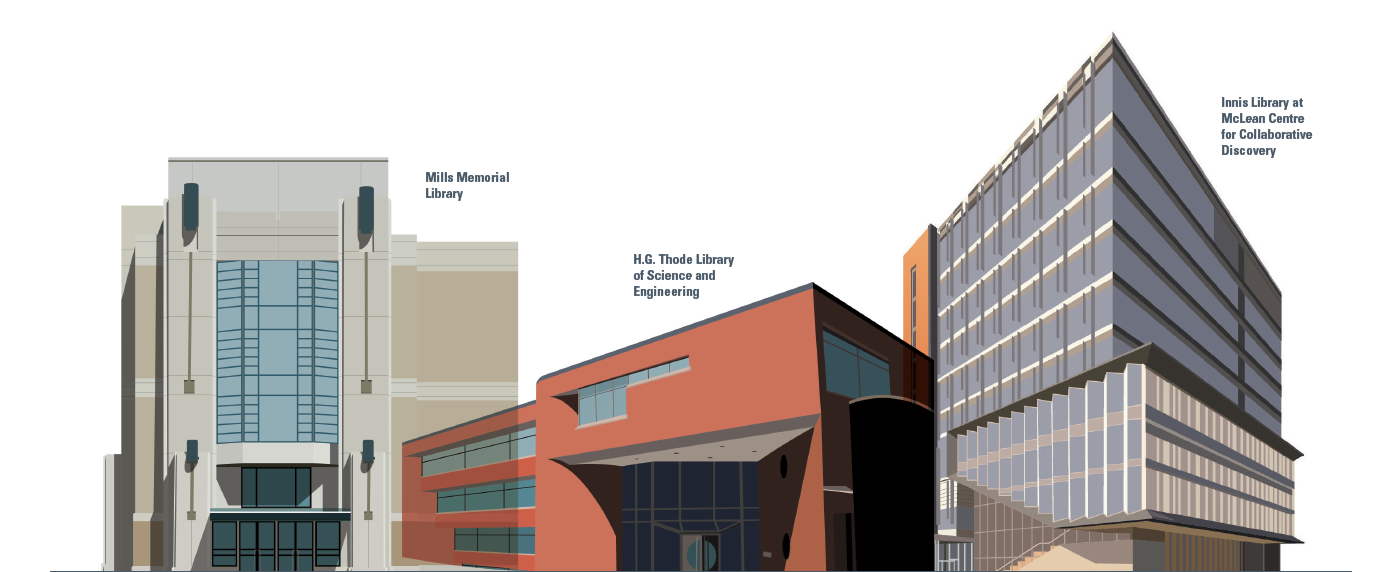
Mills Memorial Library
Mills Memorial Library is home to the humanities and social sciences collections and offers a range of special services and resources. Here are a few featured spaces within Mills library:
William Ready Division of Archives and Research Collections
Lower level, Mills library
The William Ready Division of Archives and Research Collections is the principal repository for rare books, archives, antiquarian maps, and related historical material at McMaster.
Did you know? During the 2021-22 academic year, the Archives Alive series of public events attracted a total of 704 attendees and 7,643 views for three engaging virtual presentations.
Lewis and Ruth Sherman Centre for Digital Scholarship
First floor, Mills library
The Sherman Centre provides consulting, instruction, and technical support to faculty, staff, students, and community members for all aspects of digital scholarship—from teaching and training to research, dissemination, and beyond.
Did you know? The Sherman Centre held 675 research consultations and 36 scholarly events from May 2021 through April 2022.
Lloyd Reeds Map Collection
First floor, Mills library
The Lloyd Reeds Map Collection consists of a wide variety of maps and geographical resources, including rare and historical maps, as well as local collections of fire insurance plans and aerial photos.
Did you know? Materials from the Lloyd Reeds Map Collection appeared in the wartime film, Operation Mincemeat, that debuted in 2022.
Library Accessibility Services
Second floor, Mills library
The Library Accessibility Services office supports students referred by Student Accessibility Services to obtain alternate format course material, library resources, and research items.
Did you know? The newly renovated Campus Accessible Tech Space (CATS), also located on the second floor of Mills library, is reopening for the start of the 2022 fall term.
Lyons New Media Centre
Fourth floor, Mills library
Lyons New Media Centre offers a vibrant space for the creation and use of modern and classic media in teaching, learning, and research at McMaster.
Did you know? Lyons staff printed 1,091 projects using the Centre’s 3D printers during the 2021-22 academic year.
Graduate Student and Postdoctoral Fellows Study Room
Fourth floor, Mills library
The Graduate Student and Postdoctoral Fellows Study Room is an area designed for reading, writing, and other quiet research activities.
Did you know? More than 300 new graduate students and postdoctoral fellows were provided with access to the room during the 2021-22 academic year.
H.G. Thode Library of Science and Engineering
H.G. Thode Library is home to the science and engineering collections and offers services, study spaces, and learning resources.
Thode Makerspace
Lower level, Thode library
Thode Makerspace provides an interdisciplinary and hands-on experiential learning space where the McMaster community including staff, faculty, and students from any program can gather to learn, collaborate, and make.
Did you know? Thode Makerspace is reopening September 2022.
Innis Library at McLean Centre for Collaborative Discovery
Innis Library, home to the business collections and a range of research and instructional services, is closed during the construction of its new home, the McLean Centre for Collaborative Discovery of the DeGroote School of Business.
Did you know? The new Innis Library, located on the third floor of the McLean Centre, is planned to open in fall 2024.
Other Spaces
Bertrand Russell Archives
88 Forsyth Avenue North
The Bertrand Russell Archives is home to the archive and personal library of famed British philosopher, peace activist, and Nobel Prize laureate, Bertrand Russell (1872-1970) and is one of the most heavily used research collections at McMaster library.
Did you know? The year 2022 marks the 150th anniversary of the birth of Bertrand Russell and to celebrate, we’ve installed a new in-person and online exhibit, Scientists for Peace: the Russell-Einstein Manifesto and the Pugwash Conference, on display until December 8, 2022.
Vision and Mission
Vision
McMaster University Library aspires to be a catalyst of intellectual activity for the University and its community.
Mission
McMaster University Library supports the University’s research and teaching mission by advancing knowledge and discovery, inspiring creativity, and building community.
We deliver innovative services, welcoming spaces, and exemplary collections to accelerate research, enhance learning, and improve the user experience.
A New Home for Innis Library

It isn’t often that an established university library gets a complete rebuild, but that is what’s happening at McMaster’s Innis Library.
Innis, which saw approximately 200,000 visits per year by the late 2010s, is McMaster’s beloved business library.
The space, which opened as a business library known as Innis Room in July 1974, closed its doors in March 2020 to allow for the start of construction of the McLean Centre for Collaborative Discovery.
“We are so excited to move into our new, purpose-built space within the centre when it’s ready,” said Ann Pearce, manager of Innis Library. “We know how important this library is to our business students, as well as others who use the space for study and research.”
The McLean Centre for Collaborative Discovery on McMaster’s main Hamilton campus is planned as an addition to the existing footprint of the DeGroote School of Business. The 10-floor centre has been designed as a state-of-the-art learning environment. The building is named in recognition of the Paul McLean and family’s $15 million donation.
Opening is planned for fall 2024
The new Innis Library will occupy a large portion of the third floor of the building. The library will feature many of the same popular amenities as before, such as a service desk, books and periodicals, group study rooms, a quiet study area, computers, and more. The difference, of course, is that all of this will be in a brand new, custom-designed space.
During the construction period, support for the business school has continued online and from Mills Memorial Library to ensure users have what they need.
While it will have a new look, the name Innis is here to stay in honour of Harold Adams Innis (1894-1952), an influential Canadian scholar and McMaster alumnus.
“It’s hard to imagine McMaster’s DeGroote School of Business without Innis Library, so students can expect the name to remain the same, just as we will still offer outstanding service and access to physical and digital resources,” said Anne Pottier, associate university librarian of library services/facilities. “It’s going to be a thrill welcoming the community into this new space that will serve as a place to learn, research, and study for decades to come.”
Library Ambassadors Initiative a Success
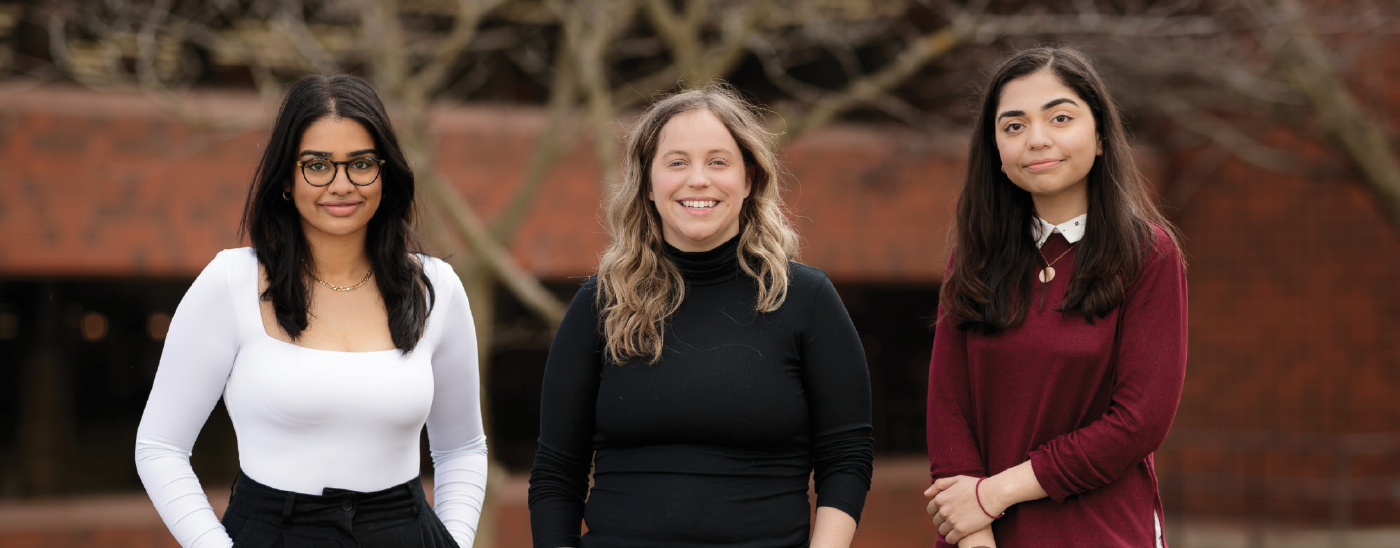
Driven by a desire to help McMaster students access and navigate library services and spaces, Ariel Stables-Kennedy decided to take a fresh approach to outreach and engagement.
After much planning, Stables-Kennedy, the first-year experience librarian at McMaster University Library, hired two students for the 2021-22 academic year to serve as the inaugural library ambassadors.
“Libraries are full of information, but they can be overwhelming for students to navigate,” she said. “The goal of our library ambassadors is to connect with students in a variety of ways to immerse them in everything McMaster University Library has to offer.”
Navigating new waters, Stables-Kennedy supported the goals of the ambassadors while letting their creativity blossom.
Lavanya Sinha, a third-year honours life sciences student, and Noor Latif, a third-year honours environmental sciences student, took on the new role of library ambassadors during the fall and winter terms, connecting students with the many spaces and services of the library.
“When I first started at McMaster, a highlight was the libraries,” said Sinha. “I really liked how there were dedicated study spaces, but I didn’t know all the services the library had to offer until much later. I wanted to help first-year students explore the library and assist them in using the services to reach their full academic potential.”
The duo spent eight months supporting social media initiatives, planning engaging events, and teaching students about the services and resources available through McMaster library.
Despite another year in an unpredictable pandemic, Sinha and Latif found inventive ways to connect with students, whether it was in-person or virtually.
Their greatest success was their weekly presence on McMaster library’s Instagram account. The duo created fun and informative videos and posts, among which featured cool study space locations, a tour of the archives and research collections, interviews with library staff, and much more.
Thanks in big part to the work of Sinha and Latif, supported by Stables-Kennedy and mentored by the communications team, the library’s Instagram account saw unprecedented growth of more than 1,000 followers during the academic year.
Another big success was the Book Club for Busy People, which attracted students from various faculties to participate in three virtual book club events.
While reflecting on her experience as a library ambassador, Latif said that she is confident she and Sinha were successful in introducing students to the library’s many spaces and offerings.
“I’d say we’ve been helpful,” Latif said. “We’ve been out here showcasing and promoting the different aspects of the library, which not only helps current students but also encourages future students to apply as library ambassadors.”
The library ambassador program will be back for the 2022-23 academic year.
Legacy of Dedicated Library Retirees Carol and Vic Nunn Lives On Through $1.1 Million Gift
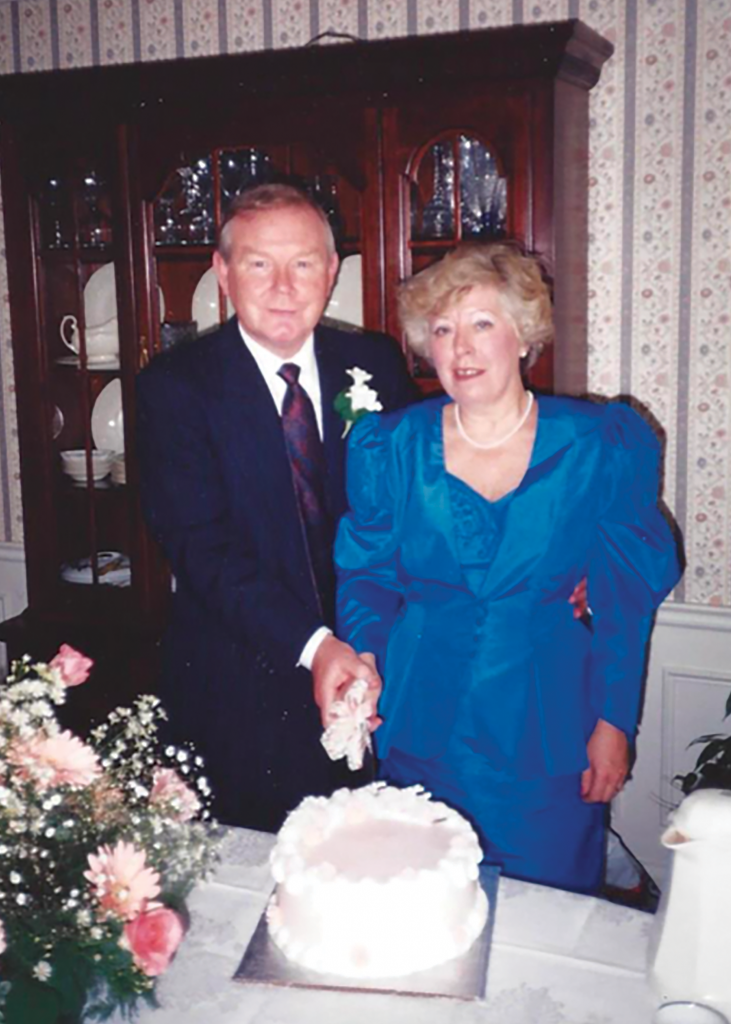
Carol and Victor (Vic) Nunn dedicated their careers to McMaster University Library, and now their memory will live on in an extraordinary way.
The late retirees bequeathed close to $1.1 million, making it one of the largest donations in the library’s recent history.
“We are moved beyond words by the generosity of Carol and Vic,” said Vivian Lewis, McMaster University Librarian. “Gifts such as this reinforce the ongoing dedication of our retirees to the life of the library.”
Lewis said the donation will help with facility renewal at McMaster University Library, which she noted would be important to the Nunns.
“They have created a legacy that will help students, faculty and community members for generations to come,” she said.
Librarians, philanthropists, friends, and leaders—few connected to the library are unfamiliar with Carol and Vic. Throughout their 30-plus years working at the library, they were well-known to staff, retirees, students, faculty, and community members.
Carol’s sister Bronwen Galloway said the library was a central part of both Carol and Vic’s lives.
“Carol and Vic met at McMaster University and most of their activities and long-time friendships evolved from their love of McMaster library,” she said.
Carol and Vic spent their early years in H.G. Thode Library before moving to new offices in Mills Memorial Library. Both vital members of the library Leadership Group, they were dedicated to and passionate about supporting students, growing the library’s research collections and improving resources. Throughout their time at McMaster, they were known for their bright personalities and willingness to lend a hand wherever needed.
After many years of working together, they were married. As a couple, they were inseparable until Vic passed away in 2019, with Carol passing the following year. After devoting so many years to the library, Carol and Vic made the decision to remember the library in their will.
Lewis said plans are now underway to formally recognize the Nunn’s generous bequest.
“We look forward to celebrating Carol and Vic’s tremendous act of generosity in a special way and recognizing the new opportunities this gift will make possible,” said Lewis.
If you would like to learn more about donating to McMaster University Library, please email Paul Grossman.
Archives alive series engages record audience and inspires during pandemic
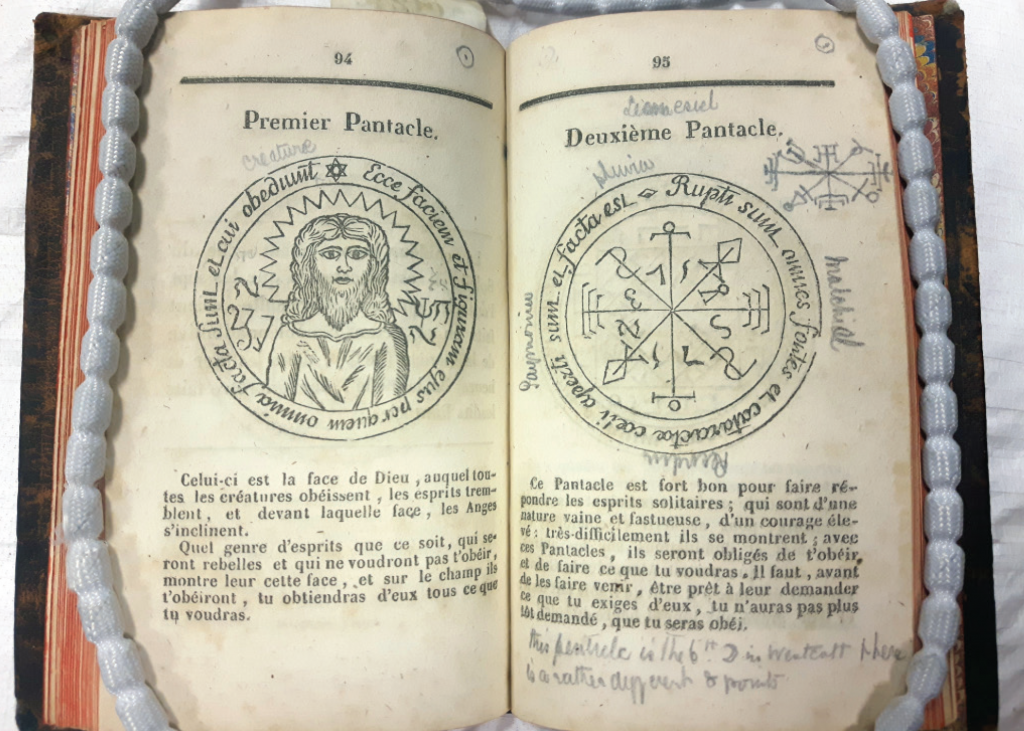
When the pandemic hit more than two years ago, librarians Bridget Whittle and Gillian Dunks worked with library and McMaster Alumni staff to ensure a new series they were leading continued.
Archives Alive showcases the unique holdings of the William Ready Division of Archives and Research Collections. Recognizing that archives can feel intimidating, these talks allow staff and researchers to share their knowledge with the community and introduce collection items housed within the library.
What started as a free, in-person presentation series with a 30-person capacity on the lower level of Mills Memorial Library transformed into a virtual experience that allowed people to watch the presentations live from the comfort of their homes.
The concept was well-received, with audiences growing from the first online event in fall 2020.
This growth continued through the 2021-22 academic year for Archives Alive with 1,156 registrants, 704 attendees, and a whopping 7,643 views of event recordings on YouTube. This represented a 51 per cent increase in both registration and attendance and a more than 1,000 per cent increase in YouTube views over the previous year.
“There’s often a great barrier, both real and imagined, to the archive and people feel like you have to get permission to come in,” said Whittle, digital archives librarian. “McMaster’s archives are very much open to the public and we wanted to make it clear that these barriers weren’t there with Archives Alive.”
Videos of this year’s talks, including on the Judith Robinson Archive, magic and occult rare texts, as well as William Morris and the Kelmscott Press, can be viewed on the University’s YouTube channel McMaster UTV. Presenters include Myron Groover, archives and rare books librarian, and Christopher Long, archives arrangement and description librarian, both from McMaster.
Dunks, archives arrangement and description librarian, says the series is special as it not only highlights materials from the archives, but also its staff.
“We wanted to highlight the expertise of the people who work here because we think it is significant and not always known within the wider McMaster community,” Dunks said. “The people who work in this department are subject experts in their areas and have so much knowledge to share.”
The 2022-23 edition of Archives Alive will feature one in-person event and three online presentations. Events will be promoted on McMaster University Library and McMaster Alumni websites.
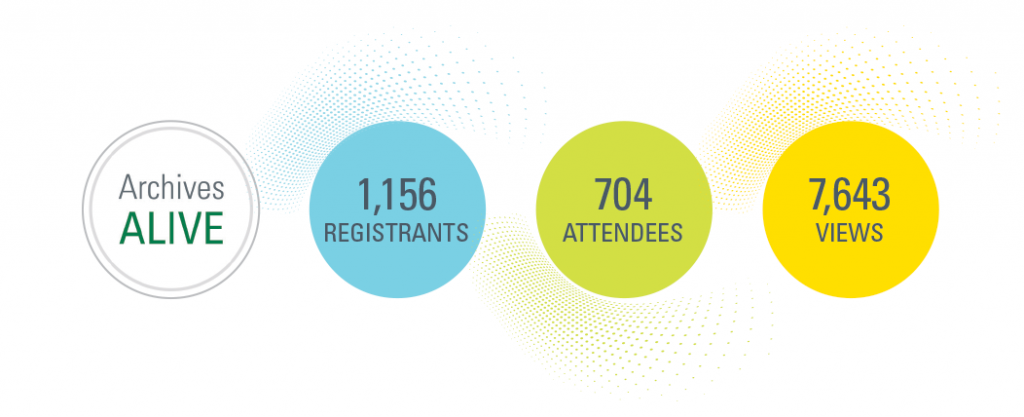
Meet the team working behind the scenes to support McMaster Research
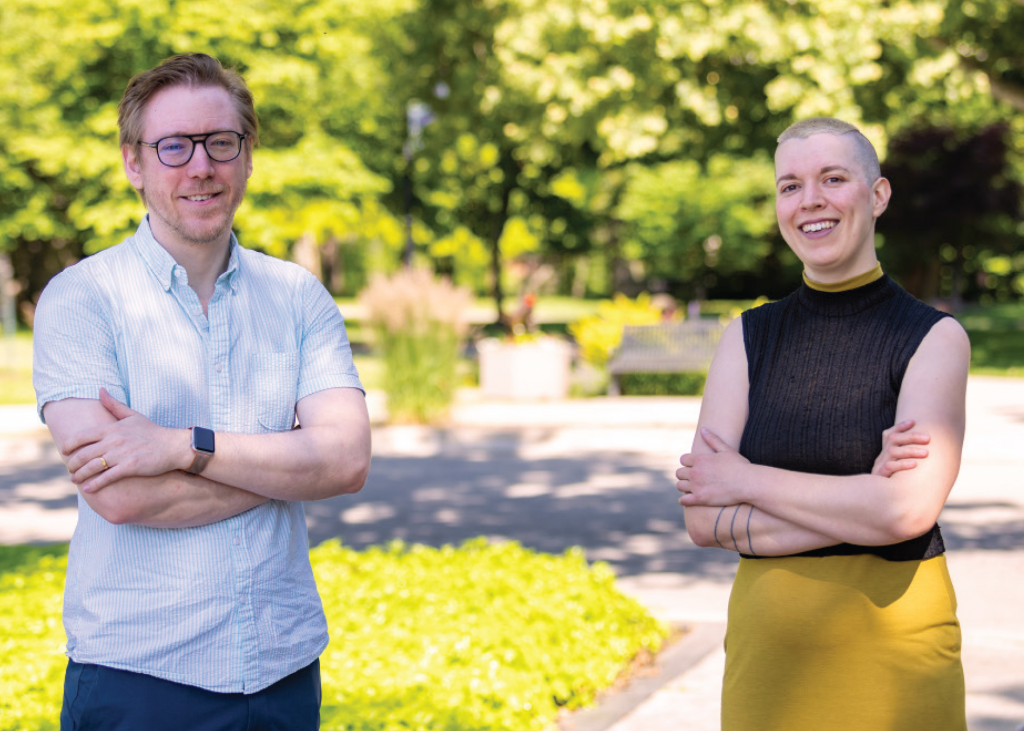
As McMaster University researchers are fostering change in Canada and around the world, a team of experts at McMaster library and Research and High-Performance Computing Support are assisting with essential research data management.
Research data management, or RDM, is the active organization and maintenance of data throughout its life cycle—from study design and planning to collection and interpretation, to dissemination, long-term preservation, and reuse.
While RDM doesn’t make headlines here at McMaster, there would be few research stories to share without it.
McMaster’s RDM experts are available to faculty, staff, and students to consult on and assist with a variety of research data management needs. This helpful team includes Isaac Pratt and Danica Evering, RDM specialists, and Subhanya Sivajothy, data analysis and visualization librarian, all under the leadership of Jay Brodeur, McMaster library’s associate director of Digital Scholarship Services, and Angela Di Nello, operations director, Research and High-Performance Computing Support.
“Research data management is an essential part of research excellence,” said Brodeur. “I’m proud of the work of this team to help ensure the success of McMaster’s research enterprise.”
Among its many outreach activities during the past year, the RDM team launched a new website; hosted 13 webinars for faculty, students, and staff; provided 7 instruction sessions to different units across campus; and held an additional 67 hours of consultations and meetings with researchers.
Meanwhile, a working group with pan-University representation led by Brodeur has started laying the groundwork for an institutional strategy on RDM at McMaster.
The need for an institutional strategy is one pillar of the Tri-Agency Research Data Management Policy, produced by the Canadian Institutes of Health Research (CIHR), the Natural Sciences and Engineering Research Council of Canada (NSERC), and the Social Sciences and Humanities Research Council of Canada (SSHRC).
“At its core, the strategy is a comprehensive plan to ensure we support our researchers and adhere to best practices around research data management on an ongoing basis,” said Brodeur. “Developing this strategy provides an opportunity to understand current services and support, identify present and impending gaps with respect to research at McMaster, and develop a plan to meet the evolving needs of our research community.”
Karen Mossman, McMaster’s vice-president, research, says effective research data management is at the crux of the University’s research enterprise.
“McMaster strives to ensure that its research makes good use of public funds, is performed ethically, produces experiments and studies that are replicable, and research results that are as accessible as possible,” said Mossman.
McMaster’s working group anticipates having a draft strategy document—based on campus-wide input and consultation—ready for review before the end of 2022.
Campus Classroom Technologies team unsung heroes of pandemic learning
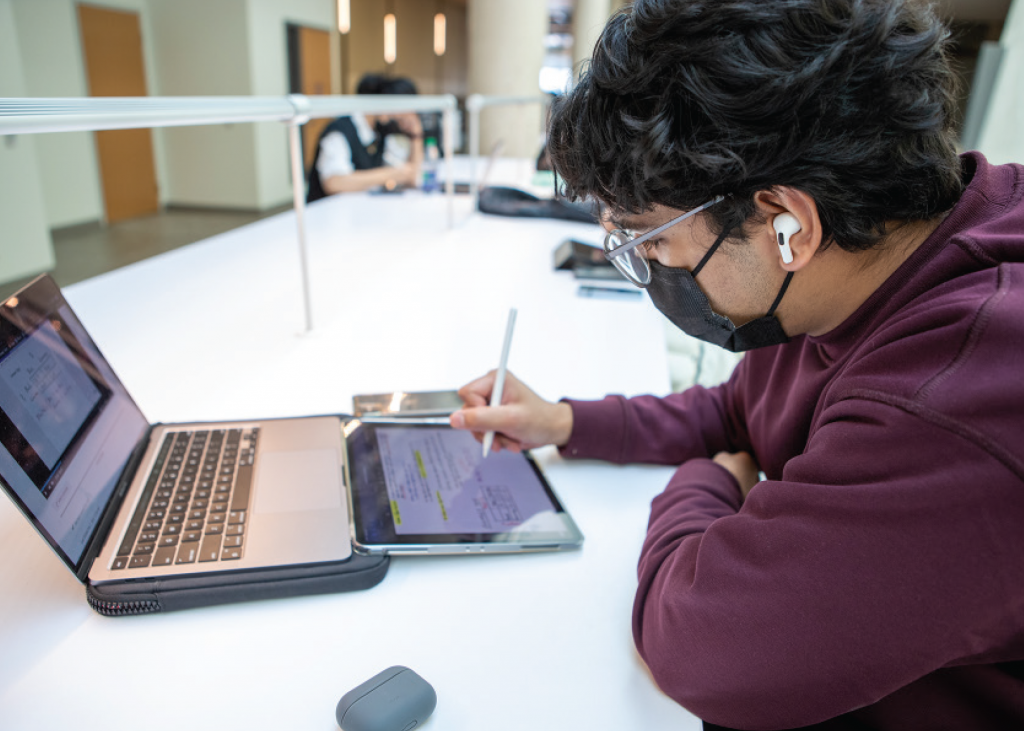
As classrooms temporarily closed at McMaster University and at other academic institutions around the world during the first year of the pandemic, the demand for reliable, online learning was pushed to front and centre in a way not previously anticipated.
McMaster library’s Campus Classroom Technologies team quietly emerged as one of the campus staff groups helping lead the way to support instructors and learners during the turbulent times of that first year and beyond.
“This small but mighty team showed dedication and perseverance through immense challenges, and many students will likely never know how essential they were to ensure their learning continued,” said Anne Pottier, associate university librarian of facilities.
The Campus Classroom Technologies team, or CCT, is tasked with the design, installation, and ongoing support of audio-visual equipment in the approximately 140 classrooms operated by McMaster’s Office of the Registrar. The team consists of 10 staff strategically situated in buildings throughout campus.
One of the team’s forward-thinking initiatives started prior to the pandemic but would prove essential during the campus shutdown and beyond. In January 2020, a five-year plan was started to renew presentation equipment across campus.
CCT aimed to standardize equipment, increasing user friendliness. Their upgrades included modern tools that could blend the in-person and virtual learning environments, including support for web-conferencing and increased capability for Echo360 lecture captures.
The updated classrooms became key sites for instructors looking to come on campus to record their lectures when learning moved online. They proved to be essential spaces when hybrid learning commenced with the return to campus in fall 2021.
The on-the-ground mobilization was led by Otto Geiss, project coordinator of Campus Classroom Technologies, who worked with a small team to fast-track the five-year upgrade plan, resulting in close to 50 classrooms already done by September 2021.
“We had already planned for upgrades but realized the pandemic would result in a need for better equipment so instructors who wanted to record lectures on campus would be able to do so,” said Geiss. “A small team of three people worked quickly and expertly to help move the University forward into modern times.”
The pandemic also saw a boom of usage of Echo360, which is operated by Campus Classroom Technologies. Echo360 is a lecture capture system which allows the recording of classroom lectures, meetings, and other events.
“I would not be able to create the flexible, accessible and inclusive learning environment that my students want—and in many cases need—without CCT’s support,” said Katie Moisse, assistant professor and associate director, curriculum and pedagogy, in the School of Interdisciplinary Science. “I think the pandemic gave us the push we needed to embrace learning technologies that centre the student experience. And these technologies are actually very fun to use.”
As hybrid and in-person models emerged with the return to McMaster, the fall 2021 term at McMaster saw a total of 4,039 Echo360 captures (recordings, live streams, and uploads). This number grew to 7,597 Echo 360 captures during the winter 2022 term.
Meanwhile, the number of captures, both live and recorded, from an on-campus Echo360 classroom grew from 1,193 in the fall term to 5,324 in the winter term.
“We found that a capture was accessed an average of nine times by a McMaster student during this past academic year,” said Joey Ricottone, audiovisual and IT specialist with Campus Classroom Technologies. “Echo360 allows students to access a missed lecture, revisit a part of a lecture as a study tool, or brush up on a topic they may not have understood the first time. We see the ongoing value of Echo360 looking to the years to come.”
McMaster Maps supporting cast in war film Operation Mincemeat
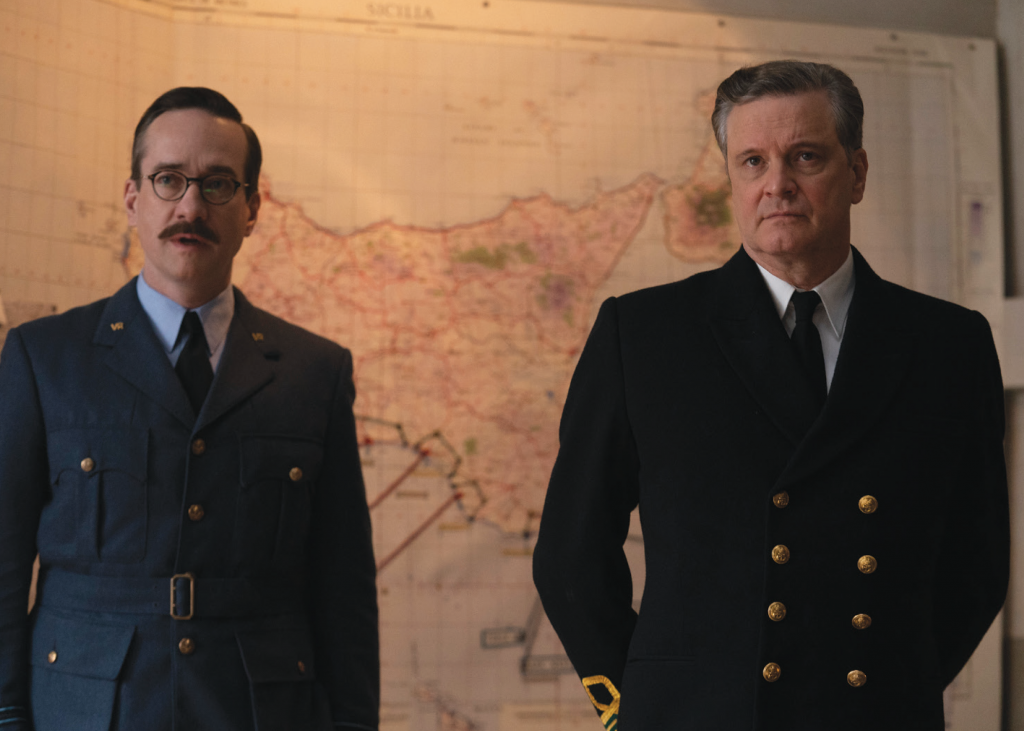
Rare maps from McMaster University Library are once again in the spotlight in the new wartime cinematic thriller, Operation Mincemeat.
Based on a true story of deception, Operation Mincemeat features two British intelligence officers who hatch an outlandish scheme to trick the Nazis and alter the course of the Second World War. Directed by Oscar nominated John Madden, the big-budget thriller features a star-studded cast led by Oscar winner Colin Firth and Matthew Macfadyen.
The film premiered in select theatres earlier this year, with Netflix distributing the film in North and Latin America in May 2022.
“It really is like seeing your friend in a movie,” said Gord Beck, former long-time map specialist at McMaster University Library who retired in 2021 after 35 years at McMaster library. “I spent years poring over these maps, and they are easily recognizable to me. It’s so very exciting to see them again in this way.”
The historical and rare maps in McMaster’s Lloyd Reeds Map Collection span the years between 1486 and the end of the Cold War in 1990. The collection is an indispensable teaching resource providing students with the opportunity to examine cartography as not just a tool for navigation, but as a work of art, an expression of power, a cultural worldview, and a chronicle of scientific advancement.
The collection features in excess of 10,000 digitized maps alone from the Second World War. It has grown to this size thanks to gift-in-kind and financial donations, as well as partnerships with the Canadian Warplane Heritage Museum, University of Alberta, and Wilfrid Laurier University, among others.
More than 20 digitized maps from McMaster were used as props and set dressing in Operation Mincemeat.
The two that are clearly identifiable in the movie’s trailer are the Cadiz and Sicilia, which were air maps produced by the Great Britain War Office in 1940 and 1941, respectively.
“During both the First and Second World Wars, there was a scramble for current topographic maps for countries where there were battles taking place,” Beck said. “These maps were probably originally produced by the Italian or Spanish governments, and the British government would have acquired them. The maps would have been translated into English, with numbers converted into imperial system units, and then mass produced for the troops.”
While these maps are accessible through various academic institutions and museums, McMaster’s forward-thinking approach to the digitization and cataloguing process has made the collection attractive to movie producers.
McMaster staff had the foresight to scan the maps starting back in 2011 at 600 pixels per inch (ppi) as opposed to 300 ppi, meaning the maps may be reproduced far larger than their original size. The team also created a variety of innovative geographic indexes that make it easy for those seeking such maps to find exactly what they need in McMaster library’s digital archive.
“Gord and his colleagues were ahead of the curve when they started the digitization process,” said Jay Brodeur, associate director of Digital Scholarship Services at McMaster library. “Although the main goal of digitization was to make these maps widely available for research and teaching, it has been a pleasure to see them incorporated into a variety of creative works and popular culture.”
This is not the first time McMaster maps have starred alongside world-famous actors in major motion pictures. Digitized items from the collection recently appeared in the First World War film 1917, which, coincidentally, also starred Colin Firth, as well as the Second World War film Fury starring Brad Pitt.
Meet Our New Staff
McMaster University Library welcomed more than a dozen full-time staff members between January 2021 and May 2022. Here, four recent additions to the library team write about their work and why it matters to the McMaster community and beyond.
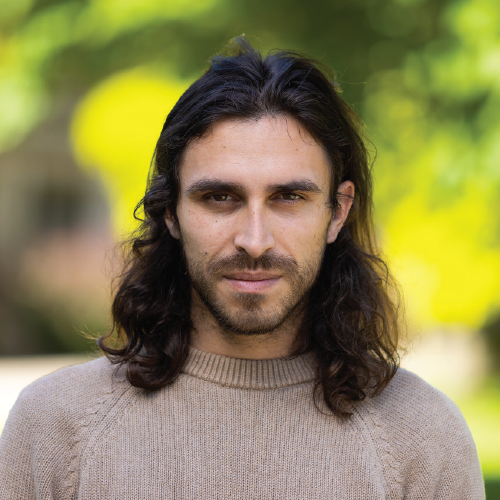
Digitization Technician
Joined Digitization
June 2021
As the Digitization Technician at McMaster University Library, I am responsible for taking the Library and Archives’ collections from the physical world into the digital world. Simply put, I create scans or photographs of rare books, posters, maps, archival records and other media not created by computers and turn them into something that can be accessed on computers. Scans and photographs are awfully flat objects when carried over from the physical world and lose layers of information that are important to both users and computers. So, the other half of my job is to ensure that the text on each page can be highlighted, read, and transformed into formats like braille or read aloud by software. This is just one of the interventions we perform to preserve information and ensure that accessibility gaps are bridged. We also describe photographs, ensure proper read order for screen readers, and correct mistakes made by automatic processing. More metaphorically put, I take reading beyond the surface of the item and bring those depths over to that seemingly endless place we love, the web!

Audio/Visual and Information
Technology Specialist
Joined Campus Classroom Technologies
January 2021
Collectively, we are shifting the way we think about our physical spaces. Our classrooms and our workplaces are no longer confined to singular brick and mortar buildings. More and more, our spaces for work and our spaces for learning shift to our homes, online, in multiple cities and countries, wherever and whenever we need to access them. Campus Classroom Technologies is one of the many teams at McMaster bridging this transformation, working with our partners across campus to fit the presentation technology in our classrooms into McMaster’s ecosystem for collaboration, for both in-person and virtual learning. We consult with instructors, faculties, and departments to make sure our classrooms can meet these needs, and to help instructors navigate the challenges of working with constantly evolving technology. Echo360 is one tool that can help accommodate hybrid learning, and it is my main area of focus. It allows instructors and students to access class content anywhere and anytime. The ultimate goal is to help everyone to have meaningful and fulfilling learning experiences.
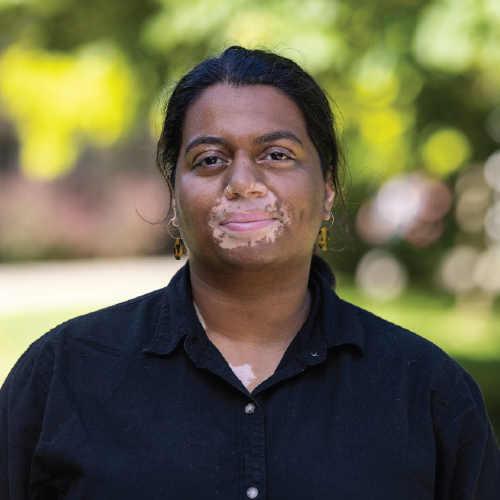
Data Analysis and Visualization Librarian
Joined Lewis & Ruth Sherman Centre for Digital Scholarship
September 2021
My role as Data Analysis and Visualization Librarian, is to develop, coordinate, and support services and programs that advance knowledge related data analysis, data, visualization, knowledge mobilization, and generally helping to increase digital fluency for McMaster students, staff, faculty, and community members. During my day-to-day, this could look like workshops, class visits and lectures, and consultations with student and faculty on short and long-term research projects. These intriguing projects can range widely from monitoring water quality to sonifying data breaches to examining TikTok algorithms. Learning how to both create, as well as critically interpret data visualizations is a useful skill to have as we encounter them constantly in news sources, social media, scientific papers, infographics and more. Improving these skills allows for researchers to translate large quantities of their data into clear and understandable graphic forms that make their research accessible for other researchers, and community members. This is important because we have seen how powerful data visualizations have been used to help us make sense of complex issues such as climate change, or COVID-19.
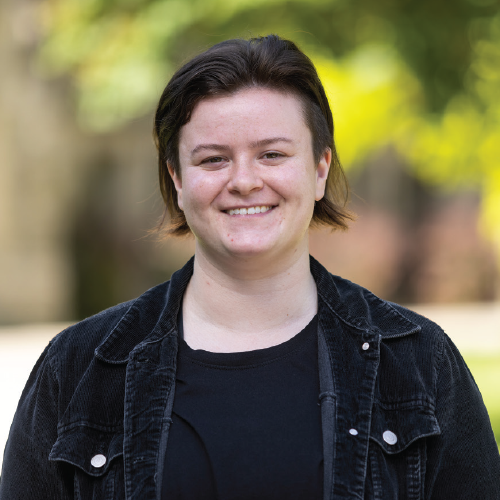
Makerspace Coordinator
Joined Thode Library
March 2022
Thode Makerspace is a specialized area that provides an interdisciplinary experiential learning space where the McMaster community including staff, faculty, and students from any discipline or program, can gather for hands-on learning. Thode Makerspace has equipment/tools such as 3D printers, a laser cutter/engraver, a sewing machine, a button press, a PCB mill, ventilated soldering stations, and more. My role is to ensure health and safety policies are being adhered to, provide training, maintain the space and equipment, foster multidisciplinary collaborations, develop workshops/events, and to offer help and guidance as needed. Oftentimes, the equipment and resources that are provided within Thode Makerspace would otherwise be inaccessible to most; our space is free to use, provides training to all, and is open to the entire McMaster community. The core values that Thode Makerspace and I share are learn, collaborate, and make. As a lifelong maker, perpetual learner, and McMaster alumni, I am proud to work here.
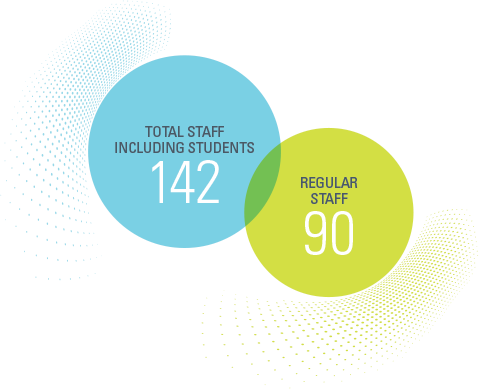
Carol Mazur Reflects on Her Time at McMaster, Her Writing Career, and Supporting the Library
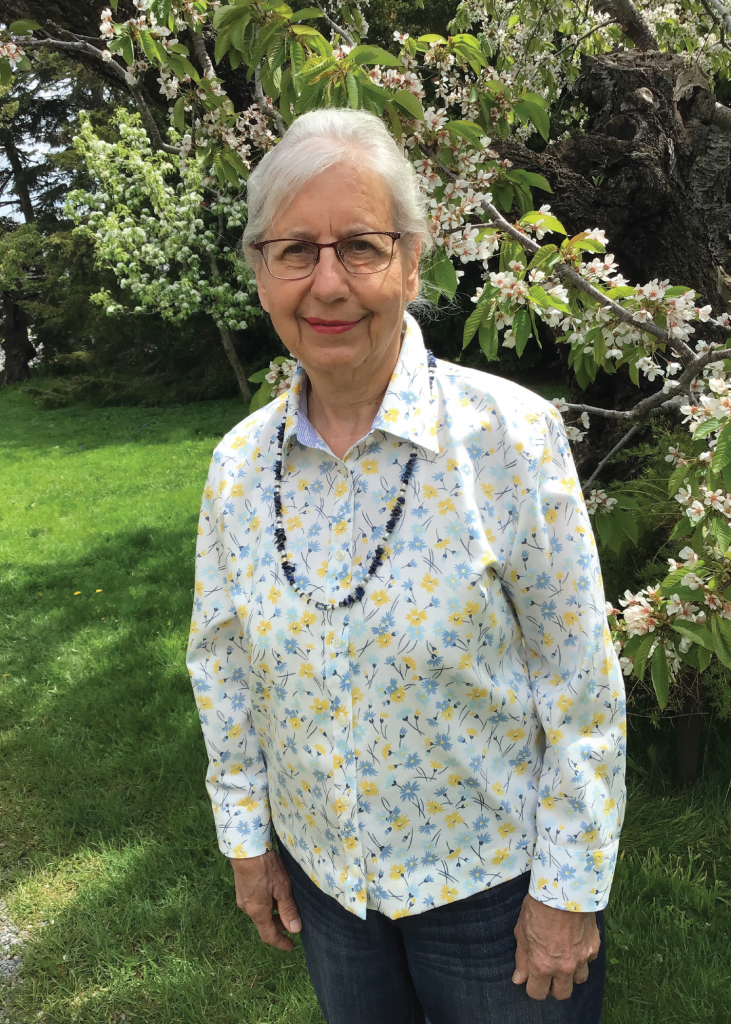
Carol Mazur is among a small number of retirees, and an even smaller number of donors, who can say they were present when McMaster University Library purchased the Bertrand Russell Archives.
The 1968 acquisition is one of many special landmarks Mazur recalls when reflecting on her long career as a librarian at McMaster.
Mazur grew up in Grimsby and in her youth spent summers picking cherries on her family’s small fruit farm.
After completing high school, she decided to attend Canada Business College in Hamilton.
“I was tired of traditional academics at the time and wanted to try something different,” said Mazur.
After graduating with a secretarial diploma, she applied for a clerk-typist position in the Serials Department at Mills Memorial Library—a move she describes as a shot in the dark.
“My sister-in-law saw the job advertised in the newspaper and urged me to apply,” said Mazur. “Looking back on it now, I’m grateful that she encouraged me because I don’t know if I would have applied otherwise. It was quite a distance to commute to McMaster and at the time I didn’t own a car.”
Mazur’s interview for the position of clerk-typist in 1965 was her first time visiting McMaster University. Shortly after the interview, she was offered the position and accepted.
“I was tasked with typing catalogue cards for new periodicals and pencilling in the holdings and call numbers on the cards,” said Mazur. “That role lasted about a year. Then my supervisor, Dorothy Clark, suggested that I should consider becoming a librarian.”
Mazur followed her supervisor’s advice, but first had to go back to school. She became a student at McMaster and graduated with a bachelor of arts in English and French literature. After this she obtained a bachelor of library science degree from the University of Toronto.
Ironically, her first position as a librarian was back in the Serials Department of Mills library where she had first started out as a clerk-typist. After a few years cataloguing periodicals, she became the serials reference librarian.
Throughout her career at McMaster library, Mazur worked in almost every reference department of the library including Serials, Government Documents, and Reference.
Each department offered her experience in different library operations: cataloging periodicals, ordering reference books and government documents, helping students to use the catalogue and find information, and providing library orientation and instruction to new students and classes.
“When I began working in Mills, computer technology was just evolving,” she said. “We were still using a card catalogue. Later the catalogue changed to microfiche and eventually to computer. Initially all the periodical indexes were in paper and cumbersome to use, nothing like the online databases we have now.
“In one of the library instruction classes, I remember trying to explain the internet as an information highway, although at the time, I didn’t understand the internet very well myself.”
Mazur dedicated a total of 33 years to McMaster library before her retirement in 2000.
When asked what made her experience at the library worthwhile, she credits the people with whom she worked.
“They were a great bunch of people,” said Mazur. “I socialized with some of the other librarians outside of work hours, and we would often attend concerts together or go out to dinner. There was a feeling of camaraderie among us.”
Now, more than 20 years since her retirement, Mazur graciously supports the library as a donor.
“I understand the costs to maintain the library’s collections and to purchase new technology,” she said. “It’s important to me to support these ongoing expenses.”
Mazur is humble about her contributions to McMaster library throughout her decades-long career but speaks highly of its impact on her.
“I grew as a person while I was both a student and librarian at McMaster. My experiences there formed who I became,” said Mazur. “I felt I should give back to the library that gave me so much.”
Now a published author, Mazur spends much of her free time at home writing.
“In 2021, I self-published a book with Friesen Press titled Lis,” she said. “It’s about an elderly peach farmer in Beamsville. The story is loosely based on the summers that I and my mother packed peaches for him at his farm.”
As for her cataloging skills? They’re not being wasted. When she’s not working on her second novel, Mazur can be found volunteering at the Grimsby Historical Society Archives where she catalogues special collections.
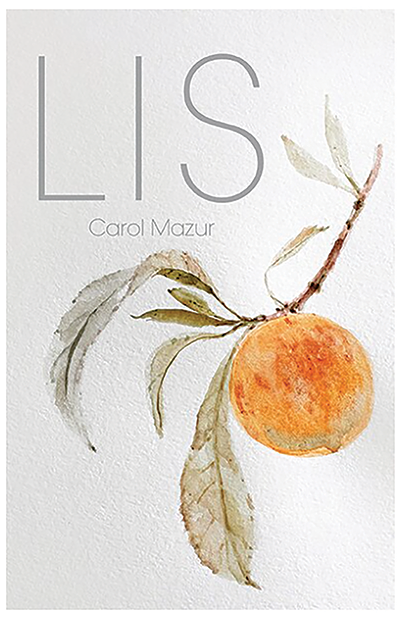
Writer in residence program flourishes

Faced with the ongoing impact of the COVID-19 pandemic, the Mabel Pugh Taylor Writer in Residence program went virtual in 2021-22 for the second year in a row.
Despite continuing online, the program aimed at connecting local writers to a well-published Canadian author for mentorship has thrived.
This year’s writer in residence was Hamilton’s Pasha Malla, an award-winning author of seven books, including the recent novel Kill the Mall.
“The writer in residence program reminds us of the importance of the arts, especially literature and writing, in both informing and entertaining,” said Vivian Lewis, McMaster University Librarian. “This residency helps foster this important outlet in our city, and we appreciate the flexibility of authors like Pasha in ensuring this program continues.”
Each academic year, the writer in residence program invites an established author to work at the Hamilton Public Library and on McMaster’s main campus to mentor creative writers from the university and the Hamilton community.
During the pandemic, Malla adapted by spending his eight-month residency connecting with local writers in virtual one-on-one consultations. He also hosted two series of free online workshops.
The art of writing workshops focused on various aspects of the craft of fiction for interested writers. Meanwhile, the business of writing workshops provided insight into grant writing and the role of literary agents in publishing.
The four workshops attracted 174 participants.
Reflecting on his impact as writer in residence, Malla said his focus was to help people achieve their writing goals.
“I can only hope that participants found our conversations useful, focused and motivating, and that they returned to their writing feeling a bit better equipped—and maybe even a little more confident,” Malla said.
The Mabel Pugh Taylor Writer in Residence program is led by McMaster University’s Department of English and Cultural Studies of the Faculty of Humanities in partnership with McMaster University Library and Hamilton Public Library. It is generously supported by the Taylor family.
The incoming writer in residence is Hamilton author Amanda Leduc.
By The Numbers
McMaster University Library faced significant hurdles during the fiscal year from May 1, 2021 through April 30, 2022. The majority of Mills library and the entirety of Thode library were physically closed through to the start of the fall term in September 2021, and again in January 2022. Meanwhile, Innis Library remained closed as construction began on its new home. Despite this, resources were made available, new materials were acquired, and services continued as staff worked to support the McMaster community and beyond in creative ways.
Information Box Group
Collections
Titles held (all formats):
3,543,417
E-books:
1,953,770
Expenditures
Total acquisition expenditures:
$11,459,044
Instruction
Library instructional sessions:
320
Total participants in group
presentations:
17,038
Reference
Number of reference
questions answered:
8,825
Circulation
Number of items borrowed:
15,626
Interlibrary Loans
Number of filled requests
provided to other libraries:
2,768
Gate Count
Mills Memorial Library:
366,080
H.G. Thode Library of
Science and Engineering:
211,294
Innis Library:
Closed for construction
Digital Experience
Main website pageviews:
1,860,687
Users:
576,996
Significant Acquisitions: Archives
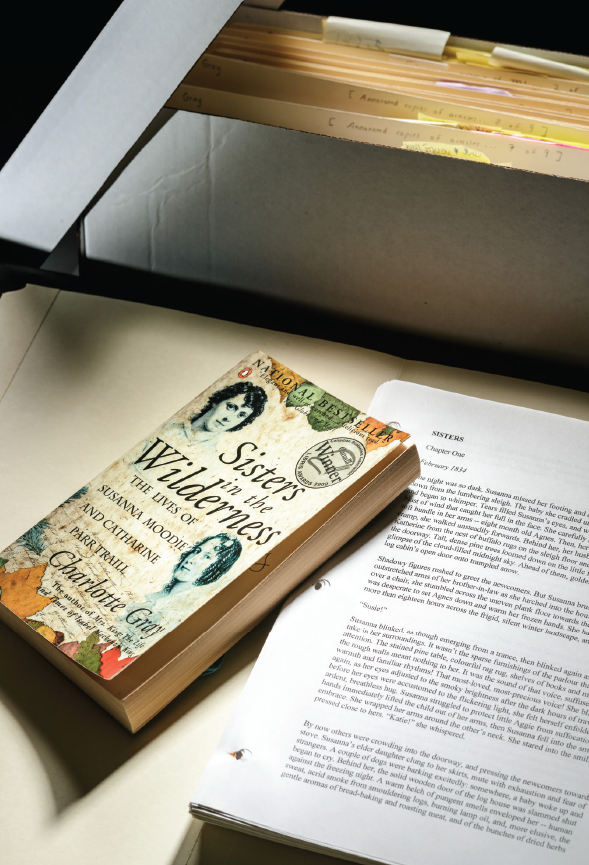
Charlotte Gray Archive
Charlotte Gray is a bestselling author of Canadian non-fiction, specifically literary biographies and works about Canadian history. A Member of the Order of Canada and Fellow of the Royal Society of Canada, she has published 11 books. Her archive contains manuscripts and research files for her best-loved works, including Sisters in the Wilderness: The Lives of Susanna Moodie and Catharine Parr Traill (1999) and The Massey Murder: A Maid, Her Master, and The Trial that Shocked a Country (2013). The archive was donated by Charlotte Gray.
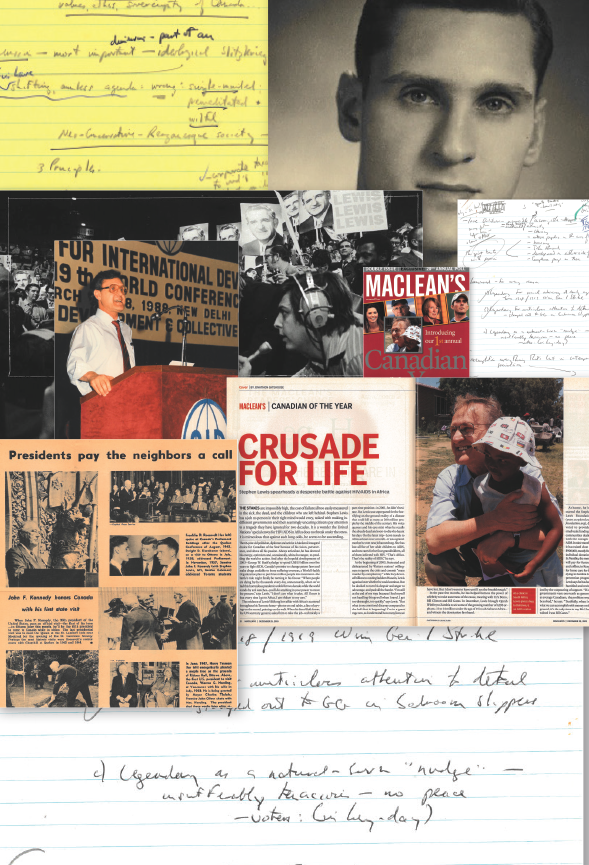
Stephen Lewis Archive
Stephen Lewis is a renowned Canadian politician, humanitarian, global activist, diplomat, and public speaker. His archive contains personal material and records related to professional roles; including speaking notes, correspondence, research material, and audio-visual material. From his campaign to galvanize global action on HIV/AIDS in Africa to addressing inequality and injustice through his work with the United Nations, his archive offers valuable insight into some of the world’s most pressing social and global health issues. The archive was donated
by Stephen Lewis.
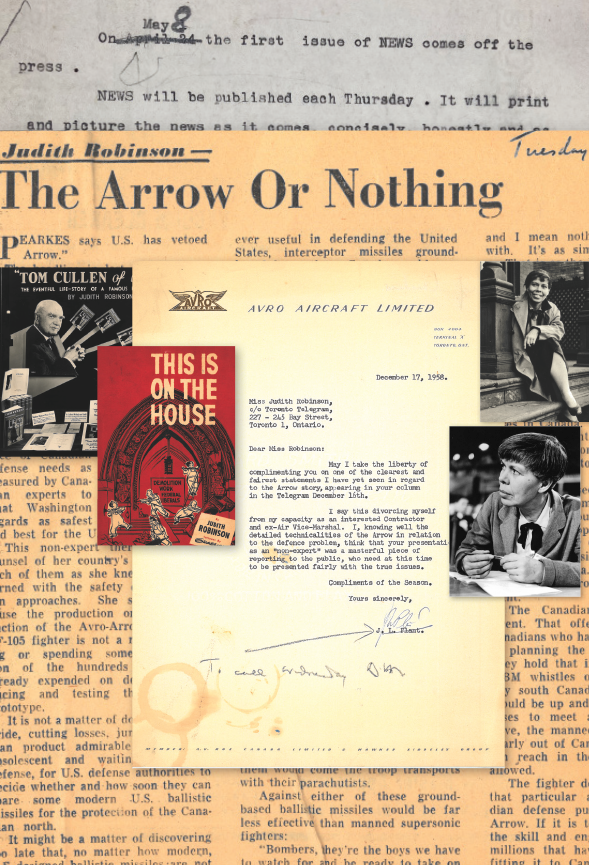
Judith Robinson Archive
Judith Robinson (1897-1961) was one of Canada’s most read newspaper columnists in the mid-20th century. Her career spanned three decades and two major newspapers (The Globe and Mail and The Telegram). She commented on all the key stories of her day—including Canada’s entry into the Second World War, the Munich Agreement, and the Avro Arrow cancellation—with fearless criticism of those in power. Her archive contains writings, press clippings, drafts, correspondence, and many other materials from her varied career. The archive was donated by Robinson’s niece, Gillian Watt.

Tom Wilson Archive
Tom Wilson is a renowned Canadian musician, storyteller, and visual artist. Raised in Hamilton, Ontario, Wilson has spoken publicly about his journey of discovery when he learned in his early 50s that he was adopted, and his ancestry is Mohawk. His archive features a variety of items, including notebooks in which Wilson recorded his thoughts, ideas for songs, draft lyrics, occasional drawings, photographs, and more. There are also sound recordings, annotated galley proofs of Wilson’s memoir Beautiful Scars, and two paintings by Wilson. The archive was donated by Tom Wilson.
Significant Acquisitions: Rare Books
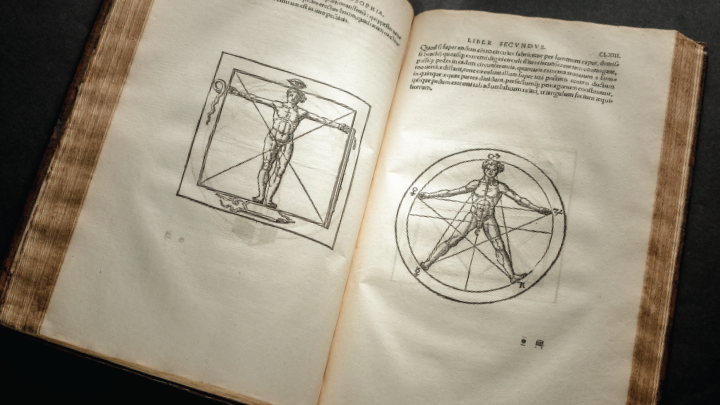
Heinrich Cornelius Agrippa
De Occulta Philosophia Libri III (Cologne, 1533)
A first edition of Agrippa’s masterpiece of occult synthesis. This book, drawing on textual scholarship and a complex hybrid tradition of Arabic, Hebrew, Greek, and Latin thought, sought to systematise and distil the essential elements of magical and divinatory practise. Its diagrams and tables of correspondence are still widely reproduced in contemporary sourcebooks; to this day, the Three Books of Occult Philosophy are a major influence on occult thinking and practise.
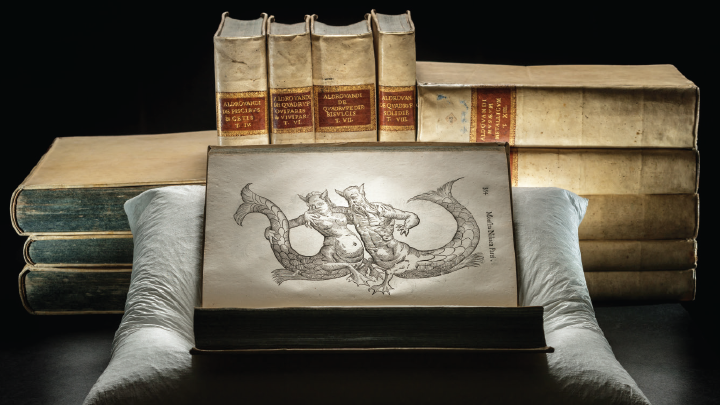
Ulisse Aldrovandi
Naturalis Historia (Bologna, 1599-1668)
A complete set, all in the first edition, of Ulisse Aldrovandi’s monumental Natural History. This enormous 13-volume treasure trove of early modern scientific thought and illustration brought together the plates of all the pre-eminent specimen engravers of the day; it remained the most comprehensive visual resource for the natural sciences until well into the eighteenth century. The scope of the project was dizzyingly ambitious; publishing the complete set took decades.
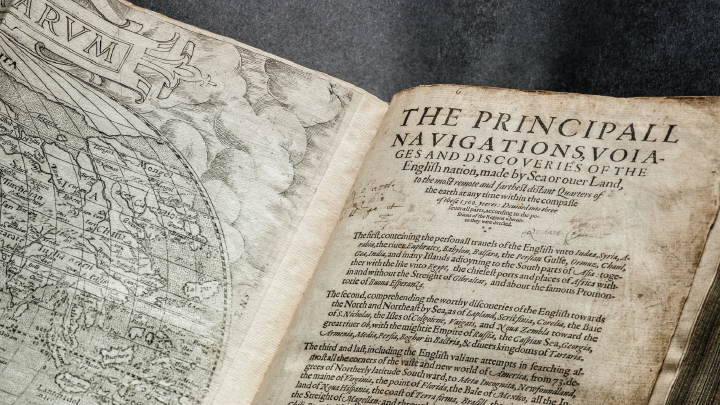
Richard Hakluyt
The Principall Navigations, Voiages, Traffiques and Discoueries of the English Nation (London, 1589)
This first single-volume edition of Hakluyt’s Principall Navigations represented a major turning point in English attitudes and ideas about “exploration” and colonial expansion. By glorifying and systematising the history of European global expansion up to his own time, Hakluyt encouraged the English to take the colonial endeavour seriously—not least, by establishing permanently settled trade colonies on the North American continent. The impact of this book on the subsequent development of the European colonial imagination cannot be overstated.
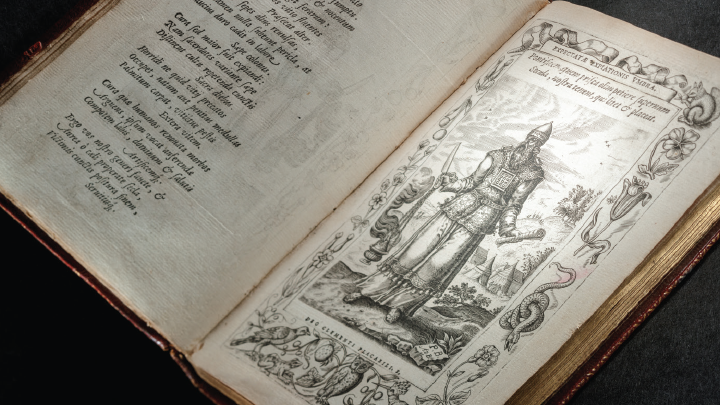
Arius Montanus [Christophe Plantin, ed.]
Humanae salutis monumenta … constructa et decantata (Antwerp, 1571)
The first edition of an important early modern emblem book—a lavishly illustrated genre exploring the meanings of biblical events. This beautiful book, with dozens of detailed engravings and eye-catching poetry to lead audiences along, was a product of the remarkable collaboration between Montanus and Plantin which also generated the Plantin Polyglot Bible. One index of Plantin’s output lists only three known copies of this edition worldwide.
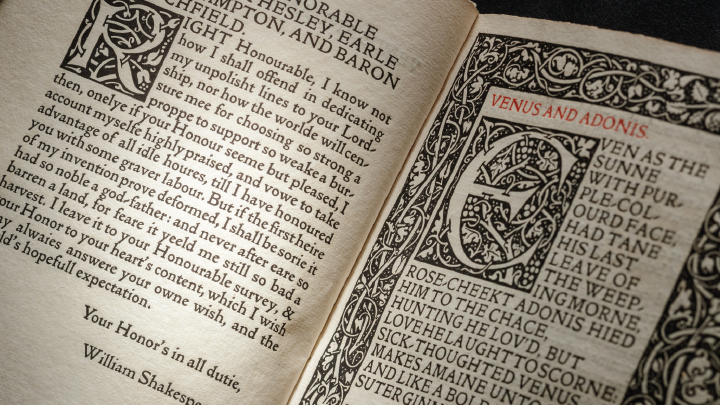
William Shakespeare [William Morris, ed.]
The Poems of William Shakespeare
(London: Kelmscott Press, 1893)
One of only five hundred copies ever printed, the Kelmscott Poems of William Shakespeare was described by Sydney Cockerell in 1898 as “one of the rarest books issued from the press” because of extremely high demand for a very limited supply. Like all Kelmscott imprints, the book is a technical masterpiece; it joins a growing collection of editions from this most famous of all private presses.
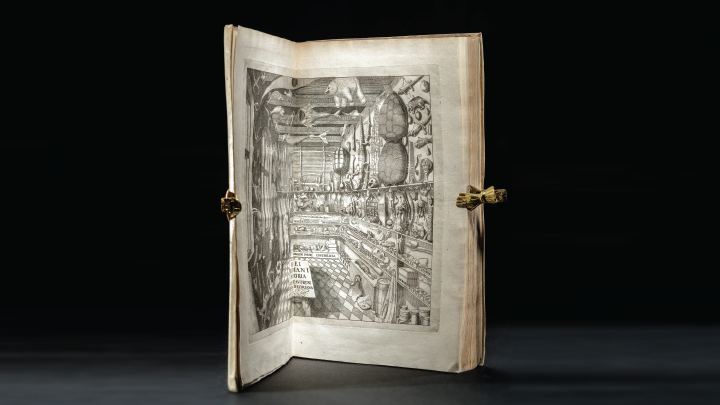
Olaus Wormius
Museum Wormianum (Leiden, 1655)
This work catalogues the famous collection of Danish physician Olaus Wormius. Wormius’ collection has become, largely because of this book, the most famous exemplar of the Wunderkammer or Cabinet of Curiosities approach to natural history and antiquarian studies during the early modern period. Its famous engraving of the collection in situ is the most recognizable image of a Wunderkammer ever produced.
2021-22 Library Leadership Group
Vivian Lewis
University Librarian
Anne Pottier
Associate University Librarian, Library Services/Facilities/Learning Support/Collections/Campus Classroom Technologies and Library Computing
Wade Wyckoff
Associate University Librarian, Distinctive,
Legacy, and Digital Heritage Collections
Jason Brodeur
Associate Director, Digital Scholarship Services
Joanne Faught
Manager, Finance and Administration
Chris Nicol
Manager, Human Resources


